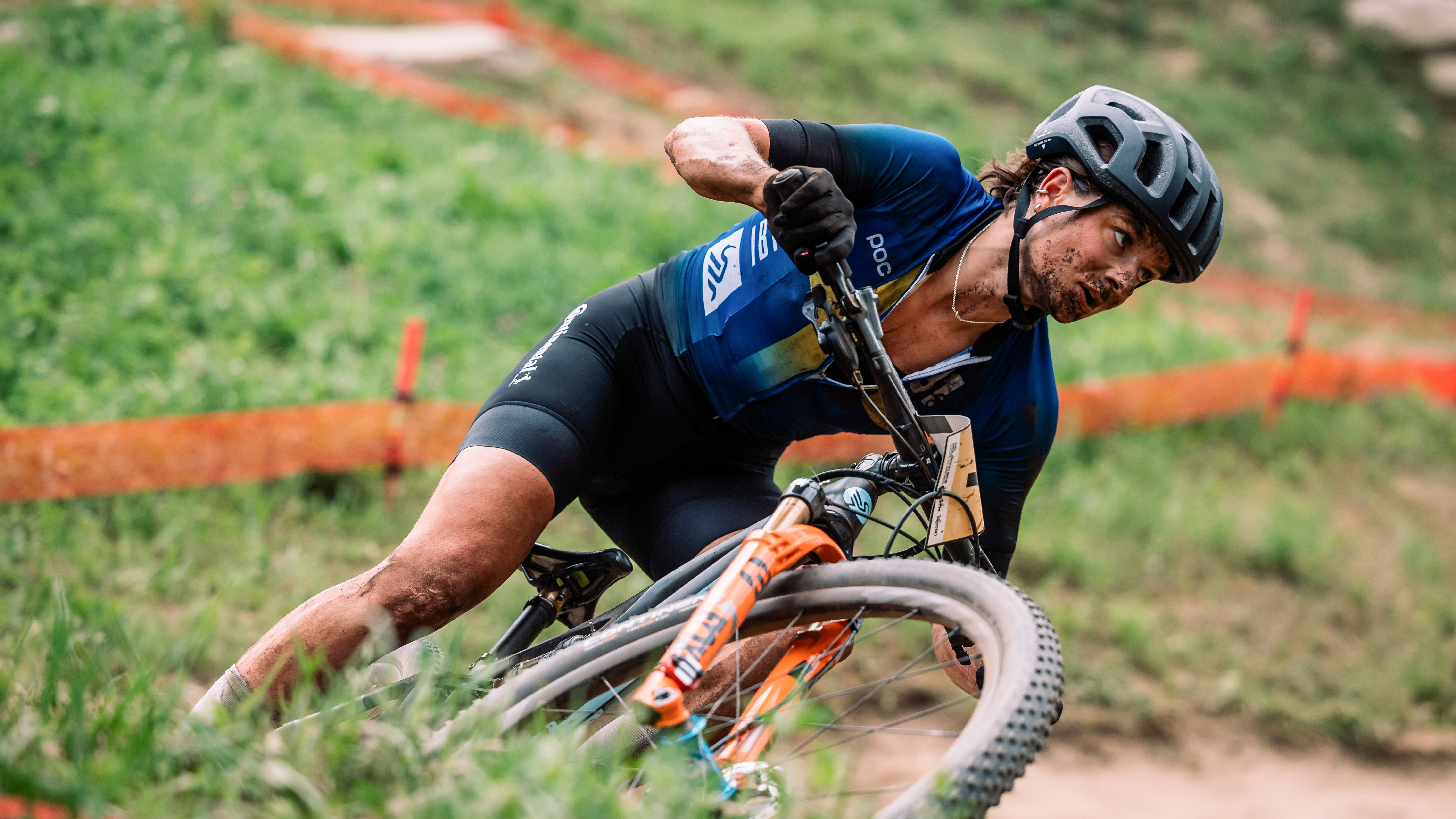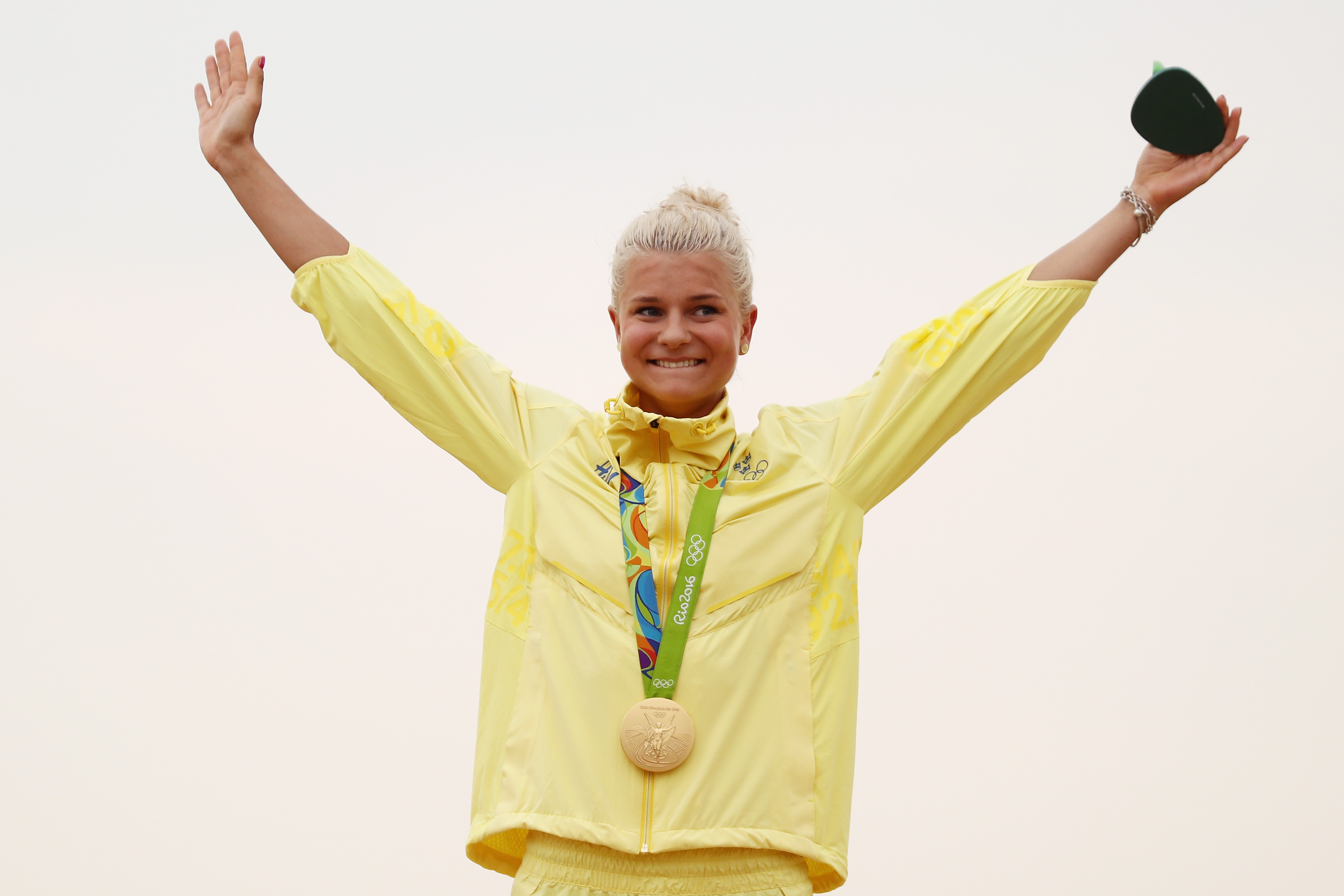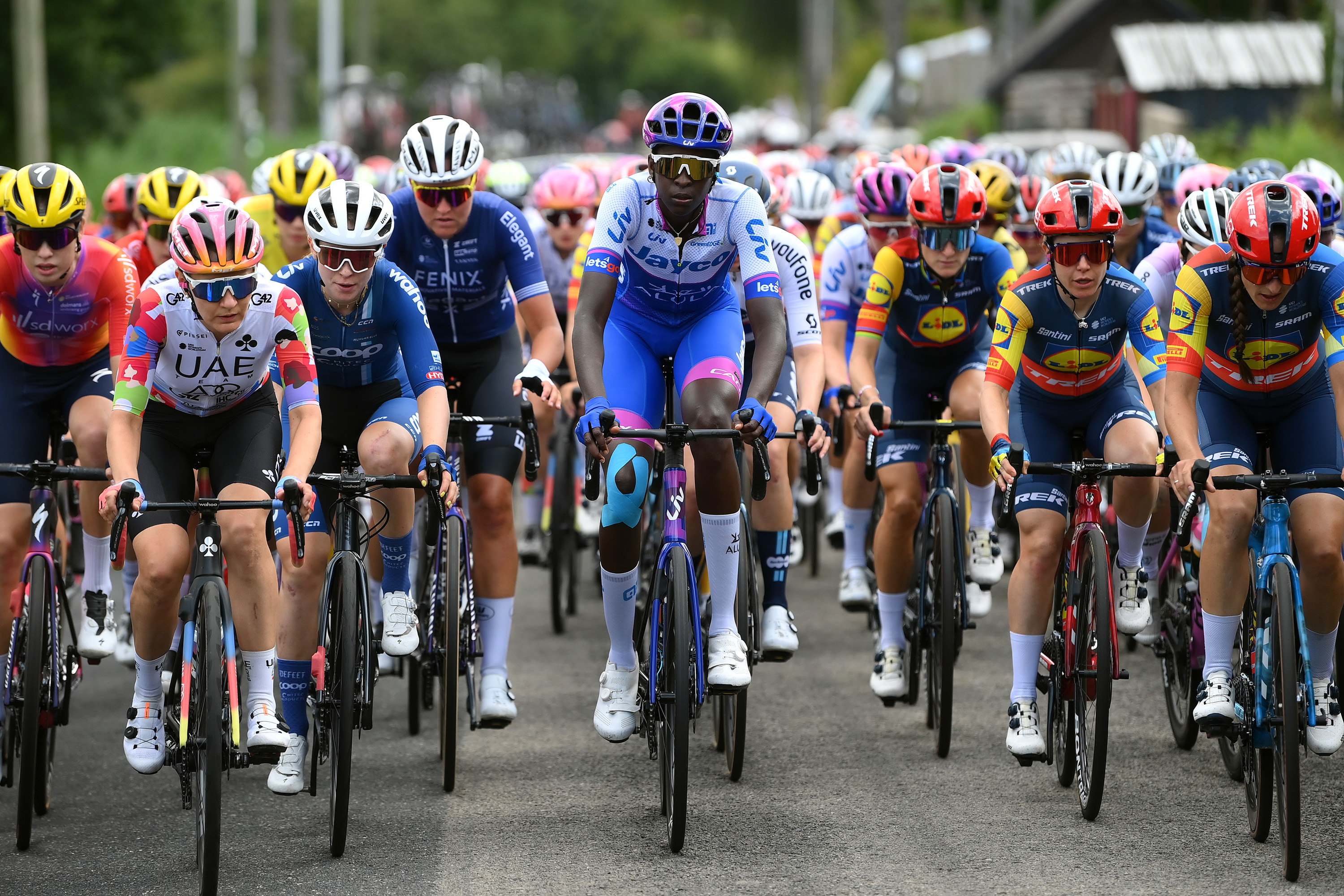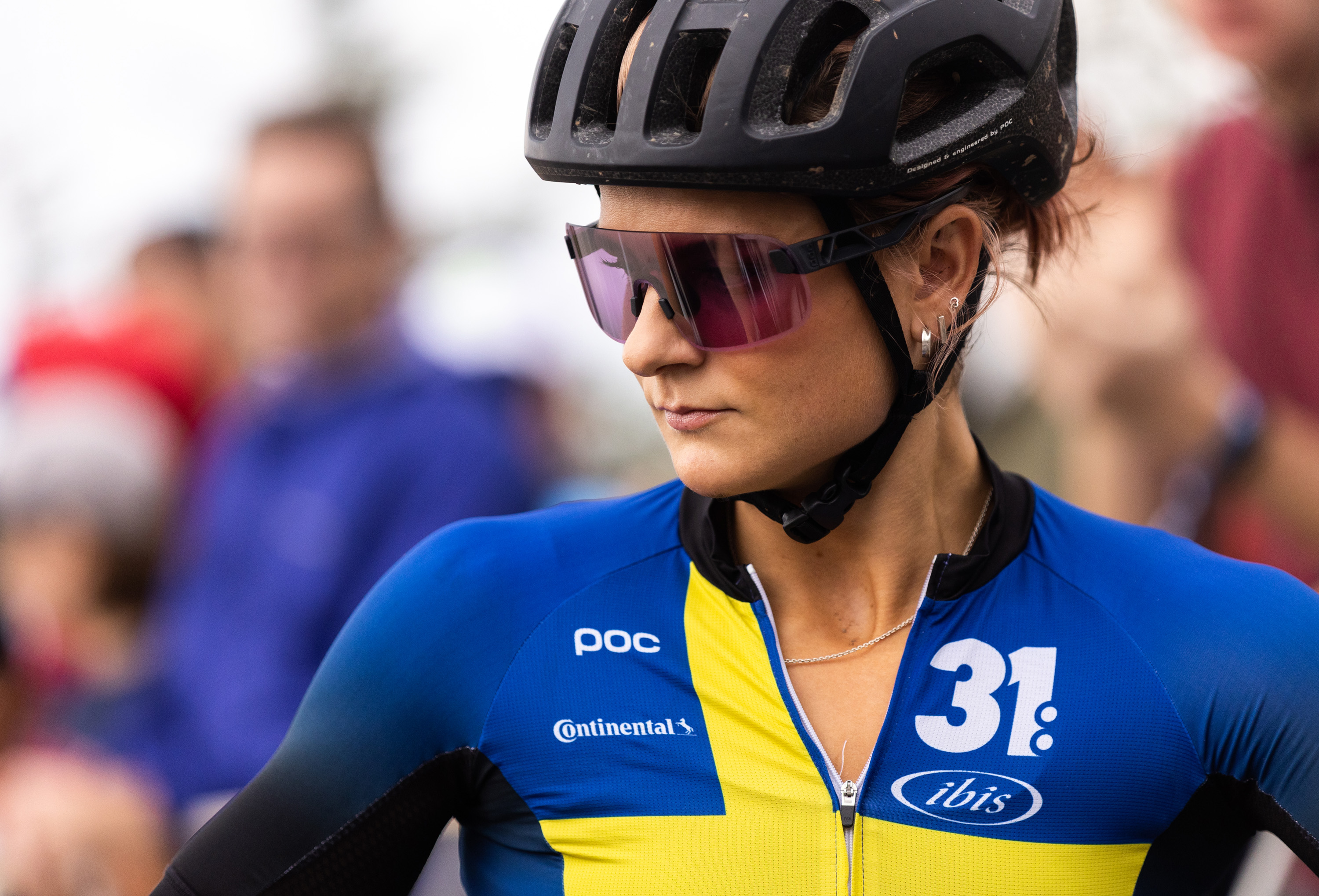
Swedish rider Jenny Rissveds, one of the most recognizable athletes in cycling, has swapped her mountain bike for a road bike and is currently leading a young Team Coop-Hitec Product among the world-class peloton competing at the Tour de France Femmes avec Zwift.
The 2016 Olympic Champion in the cross country mountain biking event aims to carry her best form into the first-ever combined Glasgow World Championships, where she would like to compete in the elite women's cross country on August 12 at Glentress Forest and road race on August 13 in Glasgow. The 29-year-old's double-disciple goals continue beyond Worlds as she attempts to qualify for both mountain bike and road events at the Paris Olympics next summer.
"What inspires me with road racing is that you work as a team and toward a common goal, and I think that's very inspiring and motivating," Rissveds said in an interview in Clermont-Ferrand at Tour de France Femmes.
"It's good training for mountain biking, and more people could benefit from doing more disciplines. It's a nice and fun experience and good training."
Pressure

Jenny Rissveds atop the Olympic podium in 2016
Seven years ago, at 22 years old, Rissveds reached what many consider the height of athletic achievement as she raced across the finish line with a commanding lead to capture the gold medal at the 2016 Olympic Games in Rio de Janeiro.
Riding into the Deodoro Pentathlon Park unchallenged after a battle for the gold against Poland's Maja Wloszczowska, Rissveds' performance was a display of power, strength and control for the 1:30 it took to her to ride away with the sport's top prize.
Following that remarkable performance, Rissveds' day-to-day life quickly became public, thrust into the limelight as the sporting world - media and fans - celebrated her success. On the inside, however, her personal life began to show signs of strain under the pressures of being a recognizable figure. Thinking back on that time, she felt she wasn't given the tools to handle how her life would change after winning the Olympics.
A disagreement with the Swedish Cycling Federation and pressure from the media, combined with two losses in her family, she struggled with depression and an eating disorder; within a year of winning the Olympic gold medal, the fastest-rising talent in cycling left the sport.
"I had mental health problems. It was everything. I won the Olympics in Rio, and after that, I think pressure from outside and media and from myself got to be too much. I was young, only 22, when I won the Olympics, and didn't have the experience of how to handle it," Rissveds said.
"You hear since you are a kid that the biggest thing to win is the Olympics. You have this big dream, and you build up a picture of how it's going to be, and then you win it, and nothing changes. You are always going to be the same person. Nothing changes just because you become the Olympic Champion.
"It was a shock for me. On the one hand, everything changed; everyone wanted to be part of my life. On the other hand, nothing changed, and I was just the same person. People looked at me differently, and that was hard for me."
"I focus on enjoying every day"
Rissveds revealed that her depression reached its lowest point when she couldn't get out of bed. "I didn't want to be alive," she looked back on her two-year hiatus from sport after winning the Lenzerheide World Cup in 2019.
Seeking treatment to manage her mental health was essential to Rissveds' recovery. She also said that during her time away from racing, she rode her bike for fun, and based her riding solely on feeling - it was vital for her to take time to recover and enjoy life again.
"I went out in the forest and had nice walks; one day, I felt like I wanted to ride my bike again, so I started to ride. After that, I started training, and it was a process to come back," Rissveds said.
"I've been in therapy a lot, which helped me a lot, and I tried to focus more on the whole performance and the journey. I only used to focus on the big goal; Worlds, Olympics, and that was everything.
"I learned to focus on enjoying every day and the process rather than achieving big goals, which is the key, I would say."
When Rissveds reconnected with racing in 2019, she had honest conversations about her struggle with an eating disorder that she said and an impact on her well-being and career. "I don't know what came first, the depression or the eating disorder. It's like if you stop eating, your brain won't work normally. Then all the pressure that came out of winning the mountain bike races and winning the Olympics, and all that mixed together - it was just too much," she said in a RedBull video interview series.

Jenny Rissveds in the peloton at the 2023 Tour de France Femmes
While at the Tour de France Femmes, Rissveds said she felt that disordered eating was a significant problem in sports and everywhere. She hopes it becomes a topic of discussion among young athletes coming into the sport to help protect their physical and mental well-being.
It's important that we talk about these issues. It's a problem; it's everywhere, not only in sports. I think you shouldn't compare too much to others. Your body is working perfectly fine, and that is enough," Rissveds said.
"As a young person, you should not think about eating less. You should eat until you're full, and when you're hungry, you eat again. Eat everything. It doesn't have to be black and white; it can be some days. You have this; another day, you have something else."
"Racing with a new mindset"
Rissveds made a remarkable comeback with a victory at the MTB World Cup in Lenzerheide in 2019. She then slowly rebuilt her cycling career on what she feels is a more robust and healthier foundation.
Since her return to racing five years ago, she has won five World Cups and has amassed 13 podiums. She began racing on the road last year and competed in a handful of races, such as Gracia Orlova, and became the Swedish Champion.
She is now competing in a selection of road races Team Coop-Hitec Product, having signed with the Norwegian Continental team in June.
She said she must stay grounded, even when competing in a race as big as the Tour de France Femmes. At the start and finish of each stage, she creates her own personal space, acknowledging that the fanfare and media surrounding the Tour de France can seem daunting. She rarely takes interviews with the press unless arranged through her agent and only joins the mixed zone at the finish line, a conscious decision to help protect her mental health. Having fun at the race is the primary goal.
"Now I have more experience, and I'm older, wiser," Rissveds said.
"I'm enjoying bike racing even more now when I have that kind of mindset and when I try to have fun and not take myself too seriously. It's more important than the results. In the end, you have to live with yourself, and if you're not happy, it will be a hard life.
"Some days are going to be tough, of course, and you have to allow yourself to feel the hard emotions and the difficult times, too. Everyone is going through it. In general, you have to enjoy what you are doing, and then you will be healthy and good, most of the time.
"What is also important to understand is that we can still win races at the highest level in the world with a totally different mindset and by just having fun on our bikes. Of course, I do my training, and it's hard, but in general, I'm having fun and enjoying life, and that brings me to the exact same level as before when I only focused on big goals."
At the Tour de France Femmes, Rissveds leads a seven-rider team that includes Stine Dale, India Grangier, Sigrid Ytterhus Haugset, Tiril Jorgensen, Lucie Jounier and Josie Nelson.
Team manager Tone Lima said that Rissveds had benefited the team by creating a no-stress environment for the younger riders. Lima said she brings calmness and experience to the team and acts as a role model.
"We can see that she has the experience because she has done big races before, even if it wasn't on the road. She knows a race is a race. She calms down the riders on our team who are very young. The Tour de France is a big race for them. We can see that they are nervous, but she explains to them that it is still just a cycling race. It's good to have her, even if she is not as experienced on the road; she is experienced in her life," Lima said.
"We can see that she wants them not to make the Tour de France bigger than it is. When you are on the start line, it is still just a race, the same as all the others. It's just that everything around the race, before and after, is bigger. We try to go into the bubble and enjoy the moments."
"We are all the same, all humans"

Rissveds currently races under the Team 31-IBIS-Cycles Continental team in mountain biking, ranked seventh overall in the World Cup standings after four rounds, and will be one of the favourites at the Glasgow World Championships.
She formed Team 31 upon her return to competition in 2019. The team's name is a nod to the United Nations' Article 31: The Convention on the Rights of the Child.
It includes a child's right to rest, leisure, to engage in play and recreational activities appropriate to the age of the child and to participate freely in cultural life and the arts.
The article also states that parties must respect and promote the right of the child to participate fully in cultural and artistic life and shall encourage the provision of appropriate and equal opportunities for cultural, artistic, recreational and leisure activity.
"We are working on it, not necessarily to grow bigger, but to activate more kids, and we arrange activities for kids at the World Cups. We ride with them and hang out with them. I think it's very important," Rissveds said.
"When I won the Olympics, people were looking up to me, which is nice, but it also creates a gap between fans and the professional athlete. It's important that we try to close that gap and show that everyone is the same on the inside, we are all the same, all humans, and I like to show the kids that. I like to integrate with the kids and hang out with them to show them that we are on the same level and can hang out as friends, just as anyone else. There is no difference between us just because I won a bike race. That's not important."
Rissveds has ridden the first three stages of the Tour de France Femmes, and between her road racing and mountain bike endeavours, she is spreading awareness to the public, athletes and children of the importance of feeling valued as a person, not for one's success in sport, but for simply being.
"It's important to talk about all sides of sports and cycling. Both have good times and bad times. We also need to talk about the process more, and not only those big moments," Rissveds said. "Of course, it is very nice to do so, but not everyone can do it. You're still worth as much as the one who wins, and your value is not based on your results."







